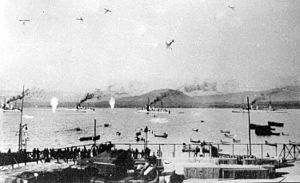Chilean naval mutiny of 1931
| Chilean naval mutiny of 1931 | |||||||
|---|---|---|---|---|---|---|---|
 The Chilean Air Force bombs the Chilean fleet at the port of Coquimbo (probably a propaganda photomontage) |
|||||||
|
|||||||
| Government-Insurgents | |||||||
| Government of Chile | Chilean Navy rebels | ||||||
| Commanders and leaders | |||||||
|
Manuel Trucco Edgardo Von Schroeders |
Carlos Frödden | ||||||
| Political support | |||||||
| All political parties in Chilean Parliament | Communist Party of Chile | ||||||
| Military support | |||||||
| Chilean Army, Chilean Air Force, Carabineros de Chile, Part of Chilean Navy | Part of Chilean Navy | ||||||
The Chilean naval mutiny of 1931 (Spanish: Sublevación de la Escuadra) was a violent rebellion of Chilean Navy enlisted men against the government of Vice President Manuel Trucco.
In 1931 Chile was bankrupt. The situation had caused the downfall of President Carlos Ibáñez del Campo on 26 July 1931. The collapse of exports and prices for Chilean products, the lack of liquidity and the high level of external debt had led the League of Nations to name Chile as the country most affected worldwide by the Great Depression. There were already 130,000 unemployed and the situation had caused the closing of the saltpeter mines in the Atacama, in turn causing a massive migration of workers to the urban centers.
As part of its attempts to deal with the Great Depression, the government of Vice President Manuel Trucco, who had taken over from President Juan Esteban Montero on 20 August 1931, launched cuts to public spending. At the end of that month the Finance Minister, Pedro Blanquier, notified all public employees, including the members of the armed forces, of a reduction of 30% in their salaries. This reduction was on top of a previous 10% cut that had been inflicted on the armed forces the year before and the loss of all extra bonuses already accrued and owed to them. The military was already suffering from chronic low salaries and these reductions were further aggravated by the loss of purchasing power that the Chilean currency had experienced due to inflation and the general recession of the economy. The discontent was specially strong in the Chilean Navy, where a strict class system was in place, separating the officers from the enlisted men.
On the night of 31 August-1 September 1931, while the fleet was in the port of Coquimbo, the sailors of the Chilean battleship Almirante Latorre mutinied, taking prisoner all the officers of the ship, who were kept confined in their cabins. The insurrection immediately spread to the rest of the fleet in Coquimbo, and all 14 units were soon in the hands of the sailors. The movement was under the leadership of Petty Officer Ernesto Gonzalez, who cabled the government demanding that they rescind the salary reduction and also notifying them that the movement was not a political one.
...
Wikipedia
